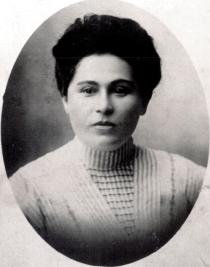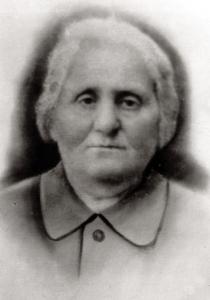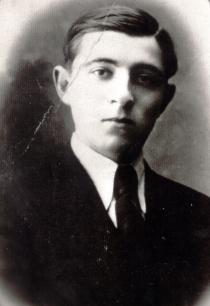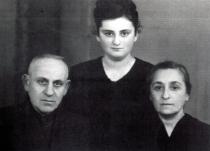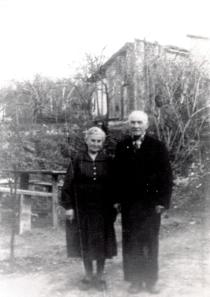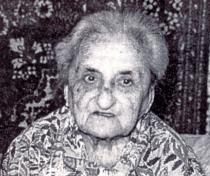Aron and Mina Trachtenbroit
This is a picture of my parents, Aron and Mina Trachtenbroit, nee Zilberman, in the yard of their house in Briceni in 1960. The photo was taken at the request of my father's cousin Isaac Trachtenbroit, who lived in Israel at that time.
I faced anti-Semitism again when I received a mandatory job assignment upon graduation. I was the best student and lecturers kept telling me to stay for post-graduate studies, but during the process of issuing job assignments this wasn't even discussed. My husband Esiah Kleiman and I were sent to work as teachers of mathematics at the secondary school in the Romanian village of Vanchikovtsy. We were teachers there for two years before we moved to the town of Yedintsy where we worked for twelve years before we received an apartment. My parents lived in Briceni and my husband's parents lived in Chernovtsy. They were getting older and we wanted them to be with us. We exchanged our apartment in Yedintsy to one room in a communal apartment in Chernovtsy. My parents joined us there. Their house in Briceni was sold to be removed.
My parents celebrated Jewish holidays after the war. If we were on vacation at the time of any holiday we always tried to join our parents for a celebration. I remember Pesach in Briceni. There was an underground bakery in Briceni. My father didn't feel well and my mother went to get matzah at the bakery with my husband. When they were on their way back home my mother heard the voices of her colleagues. She and my husband hid round the corner, waiting until her colleagues passed by to continue on their way home. It was sad and humiliating that we had to keep our wish to lead a Jewish way of life a secret. In the evening we drew the curtains to sit at the table for dinner and seder on Pesach. We had matzah and traditional Jewish food. We also celebrated Soviet holidays, but it was just an occasion to get together with those we loved and were close with. We were sincerely happy to celebrate one holiday: Victory Day.
My father died in 1977 at the age of 84. Since we worked as teachers we couldn't have a Jewish funeral at the cemetery, but we buried him in accordance with Jewish traditions. We bought him a tallit - he didn't have a tallit after the war. We invited a chazzan from the synagogue to have all the prayers said as required. All rituals were conducted at my father's funeral. The Jewish cemetery was closed at that period, so we buried my father in the new cemetery. I need to mention that I wasn't embarrassed about having my father buried in this cemetery. Do people have things to be discontent about after they die?
My mother lived with a clear mind until the end of her days. In her last years she was confined to bed since she had her hip bone broken, but she read a lot and we discussed what she had read. On 19th May 2001 my mother celebrated her 104th birthday. She died on 27th May the same year. We buried her beside my father. On the day of the funeral we couldn't have Jewish funeral rituals performed because it happened to be on the day of the Jewish holiday of Shavuot. After the holiday we invited a rabbi to say a prayer at my mother's grave. My husband goes to the synagogue on the anniversaries of our parents' death. I make some special food for the mourning and my husband takes a bottle of vodka to commemorate our parents. He also recites the Kaddish.

